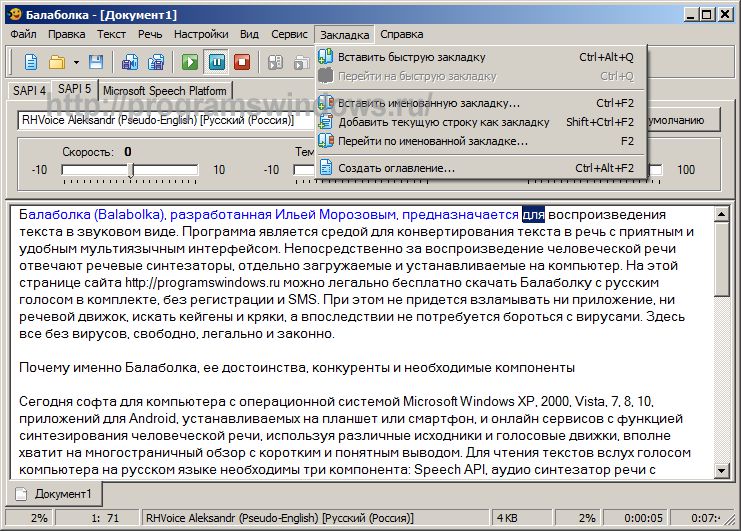Slovari Dlya Rhvoice
Feb 23, 2012 - Package Details: rhvoice-git 20181112-1. Upstream URL: Licenses.
High-level interface for RHVoice library Generate speech stream from text without re-initializing engine. This very fast and more convenient than call RHVoice-test. Supported audio formats: wav, mp3, opus, flac and pcm (raw RHVoice output). Install pip3 install rhvoice-wrapper This package NOT provide.
You must be build (or install) RHVoice, languages and voices manually. In Windows you must specify the paths for work. Rhvoice-wrapper-bin Warning!
Rhvoice-wrapper-bin not working in macOS, install RHVoice manually. Instead of RHVoice you may install.
This is best way for Windows. If the rhvoice-wrapper-bin is installed, its libraries and data will be used automatically. Pip3 install rhvoice-wrapper-bin Documentation First create TTS object: from rhvoice_wrapper import TTS tts = TTS ( threads = 1 ) You may set options when creating or through variable environments (UPPER REGISTER). Options override variable environments. To set the default value use None: • threads or THREADED.
If equal to 1, created one thread object, if more running in multiprocessing mode and create a lot of processes. • force_process or PROCESSES_MODE: If True engines run in multiprocessing mode, if False in threads mode.
Default False if threads == 1, else True. Threads mode and threads > 1 causes a segmentation faults or may return corrupted data • lib_path or RHVOICELIBPATH: Path to RHVoice library. Download nfs most wanted 2012 full version. Default libRHVoice.so in Linux, libRHVoice.dylib in macOS and RHVoice.dll in Windows.
• data_path or RHVOICEDATAPATH: Path to folder, containing voices and languages folders. Default /usr/local/share/RHVoice. • resources or RHVOICERESOURCES: A list of paths to language and voice data. It should be used when it is not possible to collect all the data in one place.

• lame_path or LAMEPATH: Path to lame, optional. Lame must be present for mp3 support.
Default lame. • opus_path or OPUSENCPATH: Path to opusenc, optional. File must be present for opus support. Default opusenc. • flac_path or FLACPATH: Path to flac, optional. File must be present for flac support. Default flac.
• quiet or QUIET: If True don't info output. Default False. Usage Start synthesis generator and get audio data, chunk by chunk: def generator_audio ( text, voice = 'anna', format_ = 'wav', buff = 4096, sets = None ): with tts.
Say ( text, voice, format_, buff, sets ) as gen: for chunk in gen: yield chunk Or just save to file: tts. To_file ( filename = 'esperanto.ogg', text = 'Saluton mondo', voice = 'spomenka', format_ = 'opus', sets = None ) sets may set as dict containing synthesis parameters as in. This parameters only work for current phrase. Default None. If buff equal None or 0, for pcm and wav chunks return as is (probably little faster).
For others used default chunk size (4 KiB). Text as iterable object If text iterable object, all its fragments will processing successively. This is a good method for processing incredibly large texts. Remember, the generator cannot be transferred to another process. Example: def _text (): with open ( 'wery_large_book.txt' ) as fp: text = fp. Read ( 5000 ) while text: yield text text = fp. Read ( 5000 ) def generator_audio (): with tts.